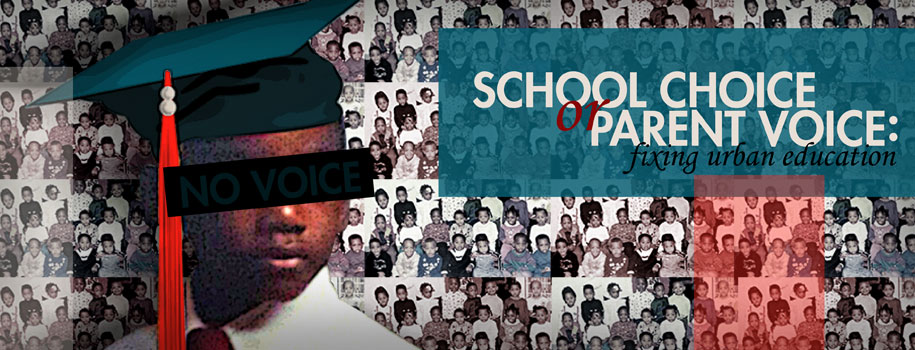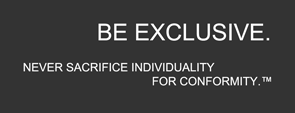
School Choice or Parent Voice: Fixing Urban Education
The “Achievement Gap” has been labeled a modern day civil rights issue. Schools today are more segregated than they were before integration, and students in urban schools are failing to graduate with the basic skills necessary for success in a college classroom. These students then arrive in college destined not to graduate (http://www.newschool.edu/milano/nycaffairs/collegereportseptember2013.aspx).
One of the solutions touted to “save” black students is charter schools, and with it the idea of school choice. But with questionable tactics for achieving their results, one begs the question, are these schools helping minority students, or hurting them. And are charter schools the answer to urban students’ problems, or can the same results be achieved with greater parent involvement in their district schools?
Charter schools are publicly funded schools that are independently managed. They do not charge tuition, and are open to the public. They are usually exempt from state mandates and often have a theme that distinguishes them from traditional public schools. Charter schools are also heavily concentrated in low-income minority neighborhoods where the public schools are failing. They are often touted as the alternative to the chaotic public schools in the neighborhood. Many of these schools claim to do what the district schools cannot do, ensure that students are performing at high levels, and are prepared for college. A number of charter operators espouse a “No Excuses” mantra, stating that poverty, and race should not be barriers to college completion.
These “No Excuses” charter school networks all claim that they have what it takes to transform urban education and close the achievement gap. These schools are in high demand with over fifty thousand students on the waitlist for charters in New York City, as well as high waitlists is many other cities. (http://www.nydailynews.com/new-york/long-waiting-lists-n-y-charter-schools-article-1.1344280). However, with a whole host of issues that include overly harsh discipline policies, high attrition rates, and poor results, one begs the question if these schools are really good for urban kids. And if these are truly good schools, why are they not in high demand in non-minority communities?
Discipline is key at No Excuses charter schools. Located in neighborhoods where the district schools are spiraling out of control, many charter schools pride themselves on being an oasis of safety. But to whose detriment is that safety being achieved. One mother details her struggles with a charter operator in New York City and their attempts to “break” her middle school aged son (http://www.blackstarnews.com/ny-watch/news/the-mis-education-of-my-son.html). Another school in Washington Heights has a “time out” room that is reminiscent of the prison system (http://www.nydailynews.com/new-york/education/padded-calm-down-room-causing-anxiety-kids-article-1.1543983).
These schools say that they “sweat the small stuff” which gives them license to suspend students for infractions as small as being out of uniform. See the infographic detailing discipline policies across charter and non-charter public schools. (http://www.edweek.org/ew/section/infographics/charter-discipline-infographic.html). These rules are reminiscent of the “zero tolerance” policies enacted in urban schools beginning in the early 90s. Research shows that the results of such policies is the expulsion of students for relatively minor infractions, disproportionate numbers of black and Latino student suspensions and expulsions, and a school safety policy that punishes offenders, but does nothing to address student behavior before it becomes a problem for the school. Many cities with large numbers of charter schools are beginning to set uniform policies governing suspension and expulsion across public and charter schools, ensuring that students across the entire sector are treated fairly. (http://www.edweek.org/ew/articles/2013/02/20/21charters_ep.h32.html).
“No Excuses” charter schools also promise to put kids on a path to college, yet KIPP, the country’s largest charter operator, admitted that they have a long way to go with a 33% six-year college completion rate. (http://www.washingtonpost.com/blogs/class-struggle/post/kipp-criticizes-its-college-graduation-record/2011/04/28/AF6Tao7E_blog.html). This six-year college completion rate, from an organization that continues to open schools proves that many charter schools overpromise and under-deliver, often to families that have the means to be successful without the help of a charter school.
It is no secret to urban educators that the biggest disconnect between failing schools and successful ones is often active parents. Research shows that parent involvement in schools is often associated with student achievement and college attendance. In fact, one charter operator understands the power of parent involvement so much they made it mandatory, via a contract (http://ednotesonline.blogspot.com/2013/01/success-academy-charter-schools.html).
But the onus to build such relationships should not simply be on urban parents who often have a great distrust for government entities. Instead, schools and active parents can employ the strategies outlined in Horsford and Holmes-Sutton’s brief “Parent and Family Engagement: The Missing Piece in Urban Education Reform” (http://www.unlv.edu/sites/default/files/24/Brief-Parent-Engagement-August2012.pdf). In this article, they outline specific strategies that urban schools can take to increase parent involvement, and thus student results. These strategies include home visits by teachers, giving parents say over some school policies, and using non-traditional forms of communication. Abdul-Adil and Farmer make it even plainer. By using the strategies of empowerment, outreach, and tapping indigenous resources, schools will be able to increase parent involvement (http://www.geocities.ws/parentsaspartners/family.pdf).
Families deserve the ability to send their child to a good school. But who is to say what is good? When we look at fancy websites, and listen to a lot of fancy talk, it is easy to get lost in the shuffle. Not everything that glitters is gold, and many families are finding that out the hard way regarding charter schools. Questionable discipline tactics coupled with poor results ensure that urban students still do not have access to a quality education. Instead students languish either in schools that are a free for all, or schools designed to break their spirits.
Not all charter schools are bad, in fact there are awesome things happening at some (http://www.english.umd.edu/news/4663). Not all district schools are hidden gems waiting for someone to take interest either. Both charter schools and district schools have something to offer low-income neighborhoods; however, it is important that families are making informed, and educated decisions about their options. It is also important that families understand their own responsibility to their child’s education. The school cannot educate your child in isolation; rather it should be a partnership and conversation between school and home. And we cannot have that conversation if the parent is not picking up.
Let us use this Black History Month to focus on the education inequality facing our students. In her book Teaching to Transgress, bell hooks, discusses her neighborhood school with great love and admiration. She says that her district school helped nurture her love of learning. All urban students deserve a school like that, not one that causes them to have breakdowns in a room designed to look and feel like a solitary confinement jail cell. Lets give our children the good education they deserve.

Great article. As a teacher in a public school, I can say that we cannot demand the same amount of parent engagement that charter schools can; we can request it and use strategies that increase it, but we absolutely cannot demand it. Private schools work because parents are actively engaged and involved in order to protect their investments. That same level of engagement, if applied to public schools, would result in miracles, and the fear of a zero tolerance policy wouldn’t be hanging over everyone. Too often, public schools are nothing more than a mirror of their surrounding communities.
Regarding the article you posted, the recommendations could work if school districts are willing to put the money behind them.
Great article.
It’s not parent involvement in schools it’s parent involvement in their kids. My grandparents were immigrants who had a 6th grade education and didn’t speak English; they never were involved in their kids schools,however they made sure they went to school everyday, didn’t allow excuses for bad behavior or bad attitudes and taught their kids that hard work and being respectful is how you got ahead in life. Schools and teachers provide free breakfast, lunch, health care…where is the parent accountability in their children’s success? My children, now adults came from a middle-class background, I went to college, their father did not.Despite being divorced we made it a priority that our kids knew that their “job” was school. They are all successful college graduates, two are teachers. It’s a pretty simple formula, the missing ingredient is Parent’s being parents.